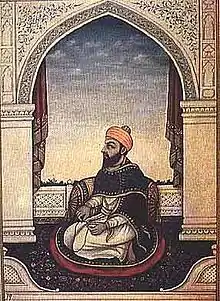Fakir Azizuddin
Fakir Aziz ud-Din (Punjabi: فقیرعزیزالدین / ਫ਼ਕੀਰ ਅਜ਼ੀਜ਼ ਉੱਦੀਨ) was a physician, linguist, diplomat, and foreign minister at the court of Mahārājā Raṇjīt Siṅgh.[1] He belonged to a Sayyid family. A Muslim and in one of many non-Sikhs in Ranjit Singh's secular government of the Sikh Empire.
Fakir Azizuddin | |
|---|---|
 Faqir Aziz ud-Din | |
| Foreign minister of the Sikh Empire | |
| Preceded by | Zahadat Shah |
| Succeeded by | Abdullah Syed |
| Constituency | Sikh Empire |
| Personal details | |
| Born | 1780 Bukhara, Central Asia |
| Died | 3 December 1845 (aged 65) Lahore, Sikh Empire, now Punjab, Pakistan |
| Political party | Party of Sikh Empire |
| Children | Shah Dilzar Khan |
| Occupation | Foreign Minister, Physician, Linguist, Diplomat |
| Fakir Azizuddin | |
|---|---|
| Religion | Shia Islam |
He was the eldest son of Hakīm Ghulām Mohy ud-Dīn and had two brothers, Nūr ud-Dīn and Imām ud-Dīn. Both had senior military posts in the empire. He was apprenticed as a physician, and was originally known by the title Hakīm (physician). Later in life he adopted the title Fakir (beggar), as a mark of humility, that title appearing in British correspondence after 1826.[1]
His first contact with Ranjit Singh was as a physician. The Maharaja was impressed by his medical skill and proficiency in languages – Arabic, Persian and English – and granted him a jagir and a position at court. His first major assignment was to assist the Maharaja in the negotiations with the British which led to the Treaty of Amritsar, 1809. Between 1810 and 1838 there followed a great number of diplomatic assignments and tasks as an interpreter. The Maharaja had complete trust in him and rewarded him with honours and jagirs.[1]
Aziz ud-Din continued in the service of the Sikh Empire after the death of Ranjit Singh. In December 1839 he represented Maharaja Kharak Singh on a mission to the British Governor-General, Lord Auckland. In 1842, on behalf of Maharaja Sher Singh, he welcomed the new Governor-General, Lord Ellenborough, at Firozpur. He remained scrupulously aloof from the factional intrigues which had overtaken the Empire after Ranjit Singh's death.[2]
Saddened at the turn events had taken and by the death of two of his sons, Aziz ud-Din died in Lahore on 3 December 1845, aged 65.
References
- Aijāzūddīn, F. S. "AZĪZ UD-DĪN, FAQĪR (17801–845)". Encyclopaedia of Sikhism. Punjabi University Patiala. Archived from the original on 8 May 2014. Retrieved 13 April 2014.
- "AZIZ UD-DIN, FAQIR". The Sikh Encyclopedia. Retrieved 14 April 2014.